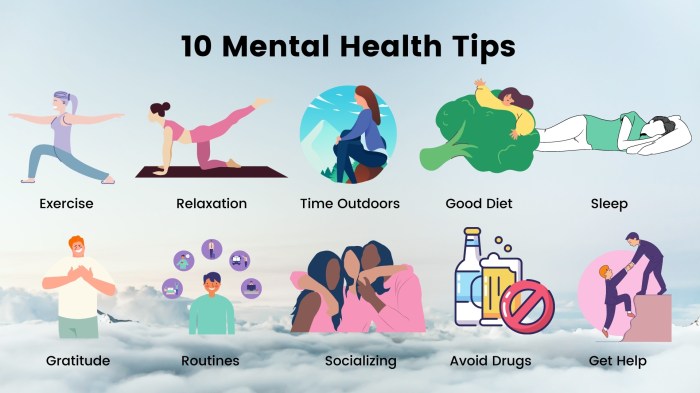Mental Wellness Tips for High School Success will take you on a journey through the importance of mental well-being, strategies for maintaining it, self-care practices, and seeking professional help. Get ready to elevate your mental game!
Importance of Mental Wellness
Mental wellness is crucial for overall well-being as it encompasses our emotional, psychological, and social well-being. When we are mentally healthy, we are able to cope with stress, make sound decisions, and maintain positive relationships.
Impact on Physical Health
Maintaining good mental health can have a positive impact on physical health. Research has shown that individuals with good mental wellness are more likely to engage in healthy behaviors such as regular exercise, proper nutrition, and adequate sleep. This, in turn, can help reduce the risk of various physical health conditions such as heart disease, obesity, and diabetes.
Relationships and Productivity
Mental wellness also plays a significant role in our relationships and productivity. When we are mentally healthy, we are better able to communicate effectively, show empathy towards others, and maintain healthy boundaries. This can lead to stronger, more fulfilling relationships with friends, family, and coworkers. Additionally, good mental health can enhance our focus, creativity, and problem-solving abilities, ultimately boosting our productivity in various aspects of life.
Strategies for Maintaining Mental Wellness: Mental Wellness Tips

Incorporating mindfulness practices, managing stress effectively, and ensuring adequate sleep are crucial for maintaining mental well-being.
Mindfulness Practices
- Start your day with a few minutes of meditation or deep breathing exercises to set a positive tone.
- Practice mindfulness by focusing on the present moment and engaging fully in your daily activities.
- Take short breaks throughout the day to check in with your thoughts and emotions.
Managing Stress Effectively, Mental Wellness Tips
- Identify stress triggers and develop healthy coping mechanisms such as exercise, journaling, or talking to a trusted friend.
- Set boundaries and prioritize tasks to prevent feeling overwhelmed.
- Practice relaxation techniques like progressive muscle relaxation or visualization to calm your mind.
Importance of Adequate Sleep
- Aim for 7-9 hours of quality sleep each night to support cognitive function and mood regulation.
- Create a bedtime routine and limit screen time before bed to improve sleep quality.
- Seek professional help if you experience persistent sleep disturbances that impact your daily life.
Self-Care Practices for Mental Wellness
Self-care plays a crucial role in maintaining mental wellness by prioritizing one’s own well-being and taking intentional actions to promote relaxation and reduce stress and anxiety levels. It involves practices that nurture the mind, body, and spirit, ultimately contributing to a healthier and more balanced life.
Examples of Self-Care Activities
- Engaging in regular exercise, such as yoga or walking, to release endorphins and improve mood.
- Practicing mindfulness and meditation to increase self-awareness and reduce negative thought patterns.
- Setting boundaries and saying no to tasks or commitments that may overwhelm or trigger stress.
- Engaging in hobbies or activities that bring joy and relaxation, such as painting, reading, or gardening.
Benefits of Self-Care Routines
Self-care routines not only help prevent burnout by replenishing energy levels and reducing stress but also improve overall mood and mental well-being. By incorporating self-care practices into daily life, individuals can better cope with challenges, enhance resilience, and maintain a positive outlook on life.
Seeking Professional Help

Seeking help from a mental health professional is crucial when dealing with persistent feelings of sadness, anxiety, or other mental health issues that interfere with daily life. It’s important to recognize when you need additional support beyond self-care practices.
Types of Therapy for Mental Wellness
- Cognitive Behavioral Therapy (CBT): Focuses on changing negative thought patterns and behaviors.
- Psychotherapy: Involves talking with a therapist to address emotional difficulties.
- Group Therapy: Provides support and perspective through interactions with others facing similar challenges.
Tips for Finding the Right Therapist
- Ask for recommendations from trusted sources such as healthcare providers or friends.
- Research therapists online and read reviews to get an idea of their approach and specialties.
- Consider the therapist’s expertise in dealing with your specific concerns or mental health condition.
- Attend an initial consultation to see if you feel comfortable and have a good rapport with the therapist.








